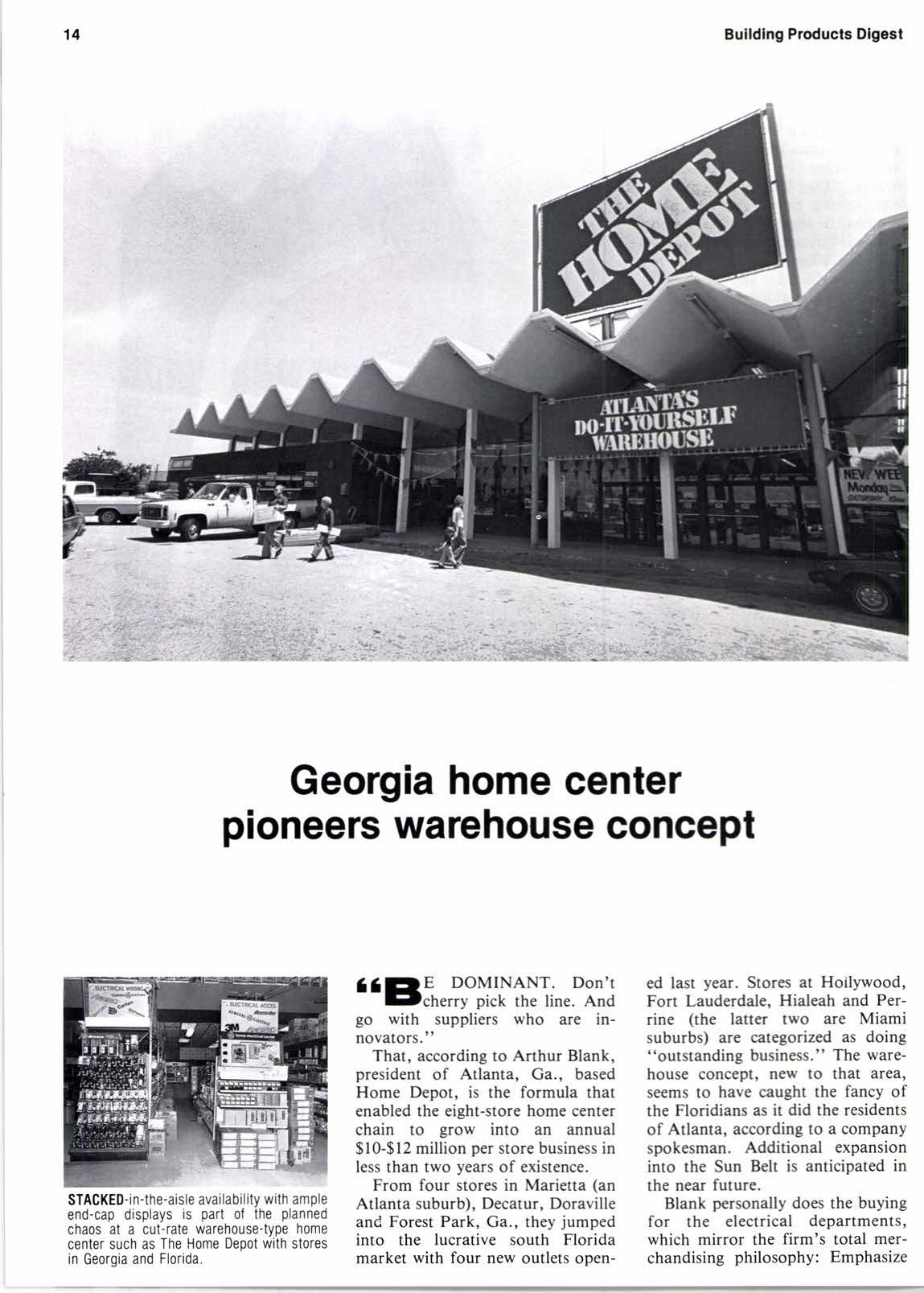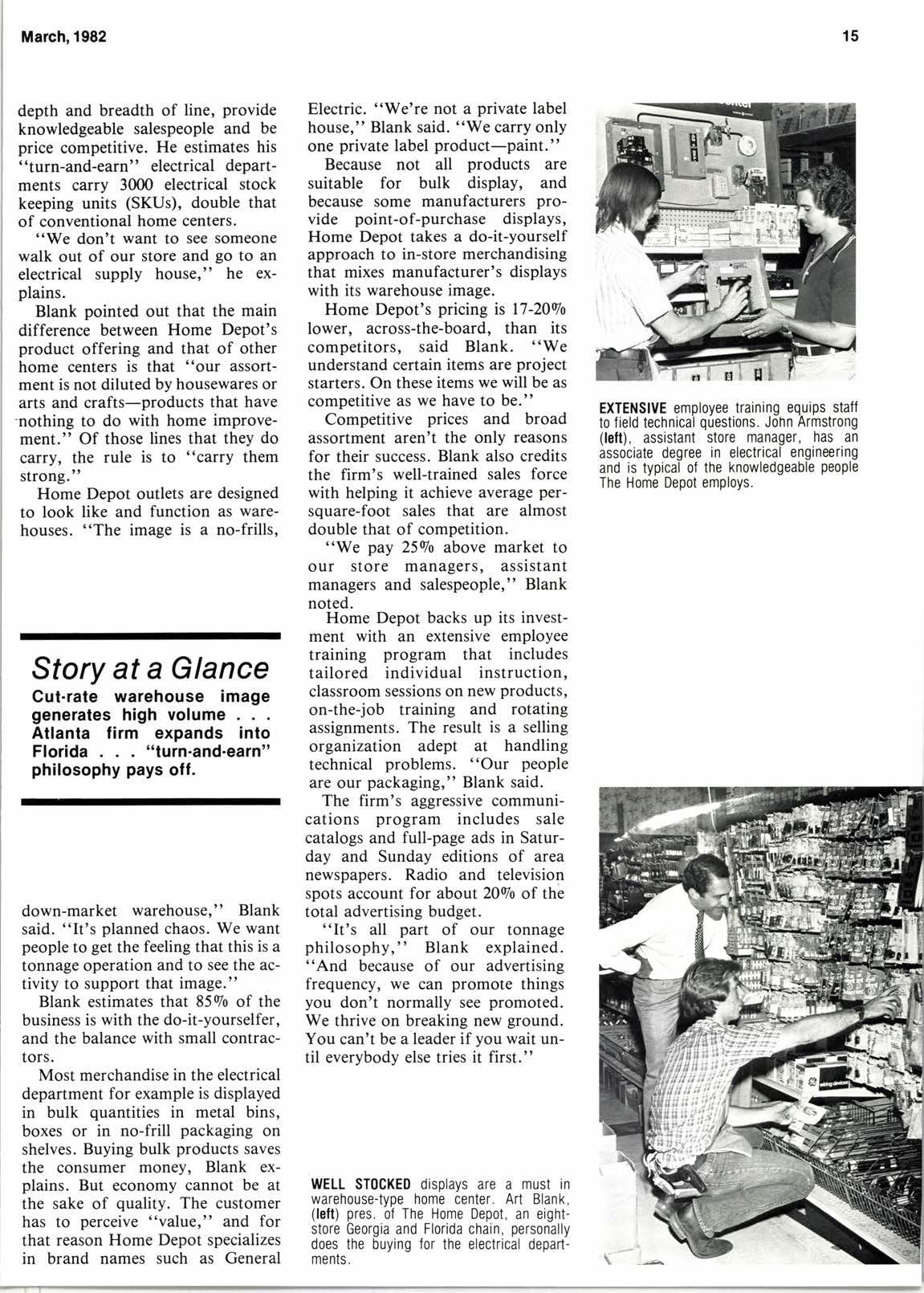
2 minute read
Georgia home center pioneers warehouse concept
That, according to Arthur Blank, president of Atlanta, Ga., based Home Depot, is the formula that enabled the eight-store home center chain to grow into an annual $10-$12 million per store business in less than two years of edstence.
From four stores in Marietta (an Atlanta suburb), Decatur, Doraville anC Forest Park, Ga., they jumped into the lucrative south Florida market with four new outlets open- ed last year. Stores at Hoilywood, Fort Lauderdale, Hialeah and Perrine (the latter two are Miami suburbs) are categorized as doing "outstanding business." The warehouse concept, new to that area, seems to have caught the fancy of the Floridians as it did the residents of Atlanta, according to a company spokesman. Additional expansion into the Sun Belt is anticipated in the near future.
Blank personally does the buying for the electrical departments, which mirror the firm's total merchandising philosophy: Emphasize depth and breadth of line, provide knowledgeable salespeople and be price competitive. He estimates his "turn-and-earn" electrical departments carry 3000 electrical stock keeping units (SKUs), double that of conventional home centers.
"We don't want to see someone walk out of our store and go to an electrical supply house," he explains.
Blank pointed out that the main difference between Home Depot's product offering and that of other home centers is that "our assortment is not diluted by housewares or arts and crafts-products that have nothing to do with home improvement." Of those lines that they do carry, the rule is to "carry them strong."
Home Depot outlets are designed to look like and function as warehouses. "The image is a no-frills,
Electric. "We're not a private label house," Blank said. "We carry only one private label product-paint."
Because not all products are suitable for bulk display, and because some manufacturers provide point-of-purchase displays, Home Depot takes a do-it-yourself approach to in-store merchandising that mixes manufacturer's displays with its warehouse image.
Home Depot's pricing is l7-20v/o lower, across-the-board, than its competitors, said Blank. "We understand certain items are project starters. On these items we will be as competitive as we have to be."
Competitive prices and broad assortment aren't the only reasons for their success. Blank also credits the firm's well-trained sales force with helping it achieve average persquare-foot sales that are almost double that of competition.
"We pay 25s/o above market to our store managers, assistant managers and salespeople," Blank noted.
Story at a Glance

Cut.rate warehouse image generates high volume Atlanta firm expands into Florida . . . "turn-and.earn" philosophy pays off.
down-market warehouse," Blank said. "It's planned chaos. We want people to get the feeling that this is a tonnage operation and to see the activity to support that image."
Blank estimates that 8590 of the business is with the do-it-yourselfer, and the balance with small contractors.
Most merchandise in the electrical department for example is displayed in bulk quantities in metal bins, boxes or in no-frill packaging on shelves. Buying bulk products saves the consumer money, Blank explains. But economy cannot be at the sake of quality. The customer has to perceive "value," and for that reason Home Depot specializes in brand names such as General
Home Depot backs up its investment with an extensive employee training program that includes tailored individual instruction, classroom sessions on new products, on-the-job training and rotating assignments. The result is a selling organization adept at handling technical problems. "Our people are our packaging," Blank said.
The firm's aggressive communications program includes sale catalogs and full-page ads in Saturday and Sunday editions of area newspapers. Radio and television spots account for about 2090 of thb total advertising budget.
"It's all part of our tonnage philosophy," Blank explained. "And because of our advertising frequency, we can promote things you don't normally see promoted. We thrive on breaking new ground. You can't be a'leader if you wait until everybody else tries it first."











